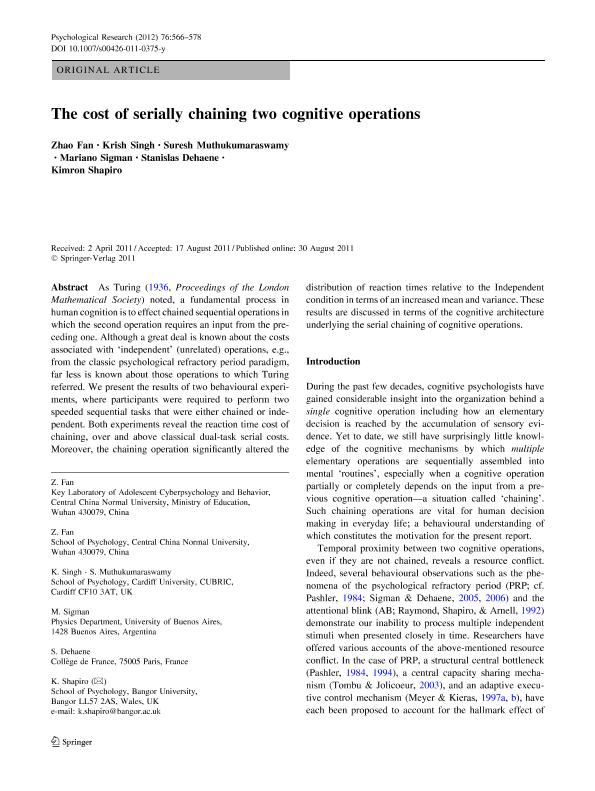Artículo
The cost of serially chaining two cognitive operations
Fan, Zhao; Singh, Krish; Muthukumaraswamy, Suresh; Sigman, Mariano ; Dehaene, Stanislas; Shapiro, Kimron
; Dehaene, Stanislas; Shapiro, Kimron
 ; Dehaene, Stanislas; Shapiro, Kimron
; Dehaene, Stanislas; Shapiro, Kimron
Fecha de publicación:
09/2012
Editorial:
Springer
Revista:
Psychological Research
ISSN:
1430-2772
Idioma:
Inglés
Tipo de recurso:
Artículo publicado
Resumen
As Turing (1936, Proceedings of the London Mathematical Society) noted, a fundamental process in human cognition is to effect chained sequential operations in which the second operation requires an input from the preceding one. Although a great deal is known about the costs associated with 'independent' (unrelated) operations, e. g., from the classic psychological refractory period paradigm, far less is known about those operations to which Turing referred. We present the results of two behavioural experiments, where participants were required to perform two speeded sequential tasks that were either chained or independent. Both experiments reveal the reaction time cost of chaining, over and above classical dual-task serial costs. Moreover, the chaining operation significantly altered the distribution of reaction times relative to the Independent condition in terms of an increased mean and variance. These results are discussed in terms of the cognitive architecture underlying the serial chaining of cognitive operations. © 2011 Springer-Verlag.
Palabras clave:
Turing Machine
Archivos asociados
Licencia
Identificadores
Colecciones
Articulos(IFIBA)
Articulos de INST.DE FISICA DE BUENOS AIRES
Articulos de INST.DE FISICA DE BUENOS AIRES
Citación
Fan, Zhao; Singh, Krish; Muthukumaraswamy, Suresh; Sigman, Mariano; Dehaene, Stanislas; et al.; The cost of serially chaining two cognitive operations; Springer; Psychological Research; 76; 5; 9-2012; 566-578
Compartir
Altmétricas



